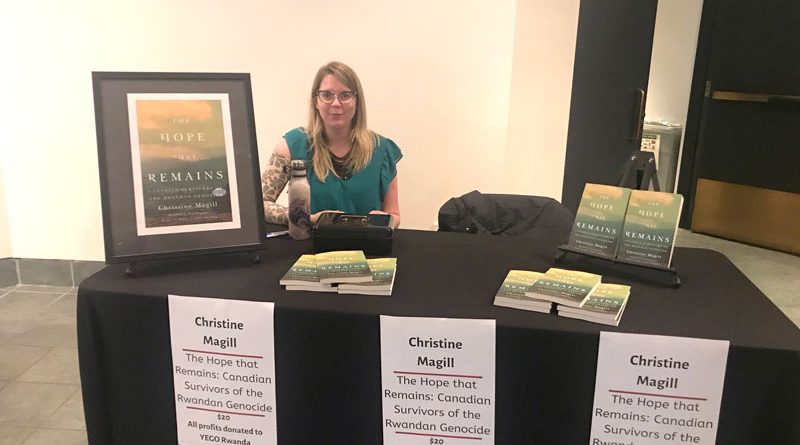Local teacher publishes testimonies of survivors from Rwandan genocide
By Adelle Ellis, Times Reporter
 Little did Strathmore High School (SHS) teacher Christine Magill know that changes to the 2008 social studies curriculum in Alberta would lead her to taking her first trip to learn about the genocide against the Tutsi in Rwanda in 2009.
Little did Strathmore High School (SHS) teacher Christine Magill know that changes to the 2008 social studies curriculum in Alberta would lead her to taking her first trip to learn about the genocide against the Tutsi in Rwanda in 2009.
The trip sparked a love for Rwanda and a motivation to share her experience with others, leading to her recently published book The Hope That Remains: Canadian Survivors of the Rwandan Genocide.
During her first trip to the country for an educators tour during the 15th commemoration of the genocide, Magill heard a devastating story from a local survivor who watched his family being killed in front of him before he was hacked in the head by a machete and left to die. The man escaped and survived, and became dedicated to sharing his story.
“He told us to teach our students to love one another and to preach against divisionism; that what had happened in Rwanda should be a lesson for the world to fight acts of discrimination or anything that might lead to genocide,” said Magill, who was so moved by his story that she started running workshops and giving presentations to community groups following her visit, along with becoming involved in the Rwandan community in Calgary where she formed many connections and friendships.
“As a teacher, I am constantly trying to help my students understand how events we learn about are connected and woven together, they aren’t isolated moments,” said Magill. “It is important to see history as a collection of individual experiences, not a set of statistics on a page.”
Magill, currently on a long-term medical leave from SHS, taught social studies and Aboriginal studies, ran the Me to We club and organized international volunteer trips at the school. Today, she spends her time focusing on her health and doing volunteer work, and she hopes to promote her book and write more in the future.
Magill has visited Rwanda five times over the last nine years, attending commemorations of the genocide and supporting YEGO Rwanda, a non-denominational Christian NGO founded to care for genocide survivors and vulnerable youth. At one of the annual commemorations where Magill was speaking, she met Will Ferguson, a Canadian author who was also inspired by her stories and encouraged her to “do something bigger with my knowledge and passion for sharing the stories of survivors.”
A few years later, Ferguson and Jean Claude, a member of the Rwandan community in Calgary, approached Magill with the idea of a book documenting survivor stories in Canada, stating that there was a grant available to support literary projects with the untold stories of Canadians.
Magill jumped on the chance and started working on the project in 2015. At the time, she was on her first medical leave from teaching, and the project gave her a sense of purpose that helped at a time where her life became centralized around medical appointments. She completed and recorded interviews and wrote stories bit by bit between 2015 and 2018.
Some stories in the book are from long-term friends or from those who know Magill through the Rwandan community. Some stories are from other parts of Canada, and many survivors contacted are still too traumatized to tell their stories or are hesitant to allow their stories to be published due to fears of their testimonies being misused by those people who still deny the genocide occurred or those who may alter or manipulate the facts and their testimonials.
Magill noted that the most difficult thing about compiling information and writing the book was not to get pulled into the stories and to not let it affect her or get overwhelmed by the tragedy. In some cases, after completing an interview, she had to take several months break after interviewing to digest some of the tragedies and stories.
“Helping survivors share their stories … I knew that sharing these stories was important, but I didn’t realize at first what an impact they’d have within the Rwandan community and within the families of survivors,” said Magill.
She added that she wants readers to understand how survivors had lives and families and friends, and to be able to see the similarities to their own lives. That each testimony is unique and important, but the stories don’t end there; that talking about what happened in the aftermath of the genocide and about how the survivors found a way to move forward is also important.
Magill hopes people don’t shy away from reading a book with survivor testimonies or about a topic like genocide, but that instead they come away touched by the resiliency, strength and hope of the individuals who have found a way to redefine their lives after tragedy.
“I think it is important these stories and histories be preserved and shared, and that we learn from them,” said Magill. “I’ve learned about forgiveness, about standing up and speaking up in the face of discrimination and racism, and most importantly I’ve learned about how to redefine and find a passion for life after a tragedy or even segments and alters the life you thought you had.”
The book contains a forward written by Ferguson and a preface by Régine Uwibereyeho King, an associate professor in the Faculty of Social Work at the University of Calgary and a survivor of the genocide.
Published earlier this year, The Hope That Remains: Canadian Survivors of the Rwandan Genocide can be purchased at most bookstores including Chapters and Amazon. The retail value is $20 and a portion of the proceeds from each sale of the book goes towards supporting YEGO Rwanda (yegorwanda.net).

